A story of cops, kelp, fear and the bizarre abalone-for-meth trade that links poor South Africans with a growing Chinese appetite for the status-symbol shellfish
Jacob rolled off the boat into black water. He fastened supplies to his dive belt, adjusted his goggles, and with an accomplice began kicking toward Robben Island. The old lighthouse, built when the island was still a leper colony in the 19th century, lit the northwestern shore in dim flashes as the men drew nearer. It was just enough light to orient themselves by in the tossing swells. Across the channel, the city of Cape Town appeared as a thin band of lights, its mountains black against the sky.
The rest of the poaching crew—ten divers, equipped with levers for prying and waterproof flashlights—got straight to work, descending to the seabed and filling their sacks with abalone, the forbidden shellfish species from which they all earned their living. But Jacob and his accomplice, two of the youngest men in the group, had told the boat captain that they had a bolder plan. Instead of diving just once, like they ordinarily would have, the two would break off from the group and camp out on the island, snorkel the kelp beds for a full day, and gather up a massive haul of abalone before returning home the following night. For their efforts, the two men anticipated earning $5,000 each. It would be a massive amount for South Africans of their station. But that’s the promise one of Africa’s oddest illicit trade routes, in which poachers like Jacob snatch wild abalone and sell them to transnational crime syndicates that send the shellfish to China, not for cash, but in exchange for quaaludes and the chemicals used to make crystal meth.
This was 2010, and Jacob (a pseudonym) was accustomed to rough conditions; he had already been poaching abalone in Cape waters for ten years. His face and hands stung from the cold as he swam. In one of his dive pouches he carried a fully charged cellphone, sealed against the water inside two condoms. He reminded himself to text his wife, who was waiting anxiously at home with their two young children, as soon as he got ashore. Unlike many poachers he knew, Jacob didn’t blow his cash chasing a party lifestyle, focusing instead on looking after his family. Winter was approaching, the roof needed fixing again, and his three-year-old daughter was quickly growing out of her clothes.
The waves surged as the shelf grew shallower. “There’s a way through here,” Jacob called to his partner, seeing a gap between the rocks. The men crawled onto the beach, slipping on wads of kelp. They heard the boat depart, the grind of its outboard motors fading behind the surf. Robben Island, where Nelson Mandela was jailed for 18 years during apartheid, is an exposed outcrop in the middle of Table Bay; the men sat a while catching their breath, watching lighthouse beams pulse across the Atlantic. They unpacked their provisions from sealed bags, changed into dry clothes, and stuffed a bottleneck pipe with cheap marijuana, crushing a small white mandrax (a local term for quaalude, which is used more widely in South Africa than anywhere else in the world) pill into the mixture. Then they stashed everything beneath a bush, lit the pipe, reclined in the grass, and waited for dawn.
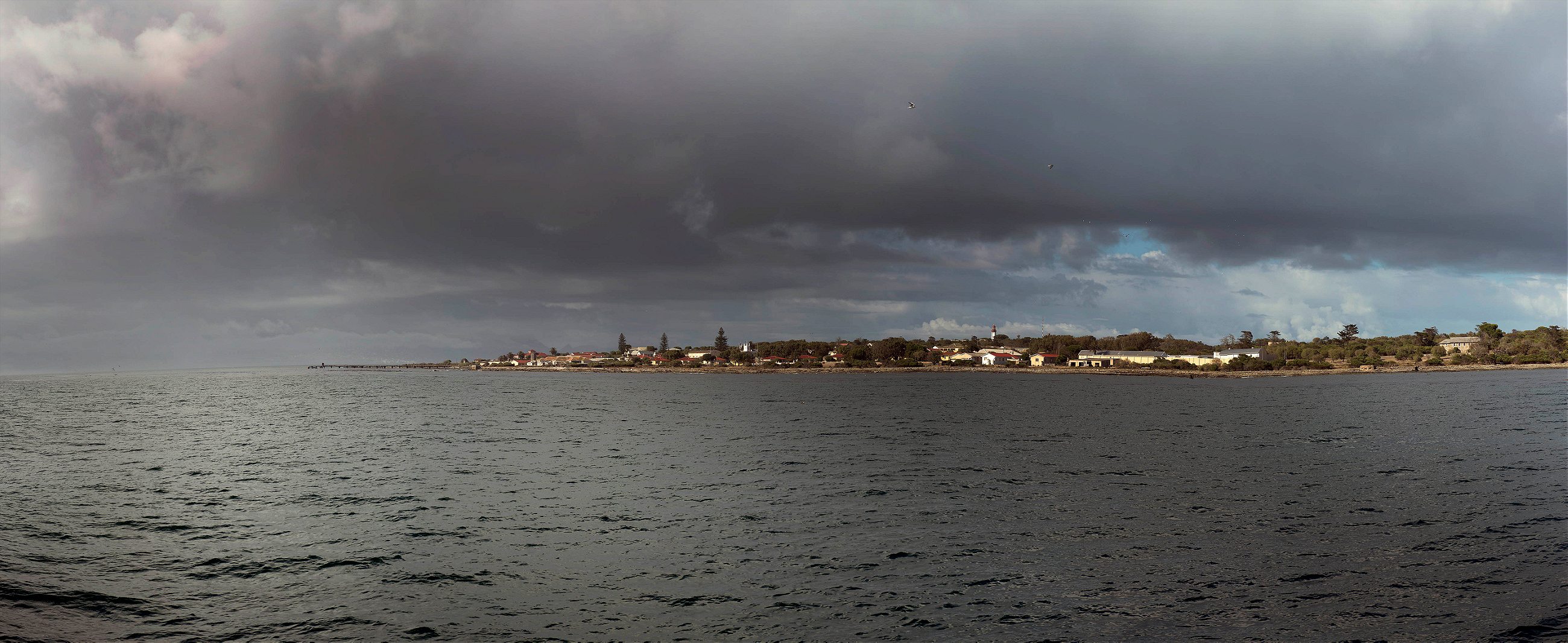
A large, kelp-grazing snail, abalone is prized as a culinary status symbol in China, both for its flavor and for its coincidental resemblance, when dried, to a gold ingot, which has turned the obscure shellfish into a marker of wealth. Demand for abalone has risen particularly with the growth of China’s middle class. One of the most coveted varieties of abalone is found only in South Africa, where non-white fishing communities are still trapped in cycles of poverty long after the end of apartheid. Once abundant, the species has been poached to the verge of commercial extinction over the last 25 years; its high value and ease of access, coupled with systemic inequality, has given birth to a deeply entrenched illicit trade. For hundreds of divers like Jacob, poaching remains an attractive proposition, despite its considerable risks.
A stout, round-shouldered man with cropped hair and scarred hands, Jacob has been poaching abalone his entire adult life. I met him in 2012 when I began conducting interviews in the Cape Town fishing community of Hangberg, where abalone poaching had become endemic. Born to teenaged parents, Jacob was raised by his grandmother, a low-paid domestic worker.
His grandfather was a fisherman and spent little time at home. When Jacob was 13 years old his father, a municipal electrician, moved in with a new girlfriend and cut back on his infrequent support payments. Jacob’s grandfather had just contracted lung cancer and could no longer go to sea.
That Christmas, Jacob had to buy himself cheap clothes while his friends all got “nice presents” from their families—sneakers, football gear, cash. “That’s a shit experience when you’re young,” he told me when I visited him at home recently, standing outside his wooden shack among a clutch of mismatched chicken coops. “I felt stupid.” To avoid further embarrassment he decided to become self-sufficient, which for many in Hangberg means learning to dive.
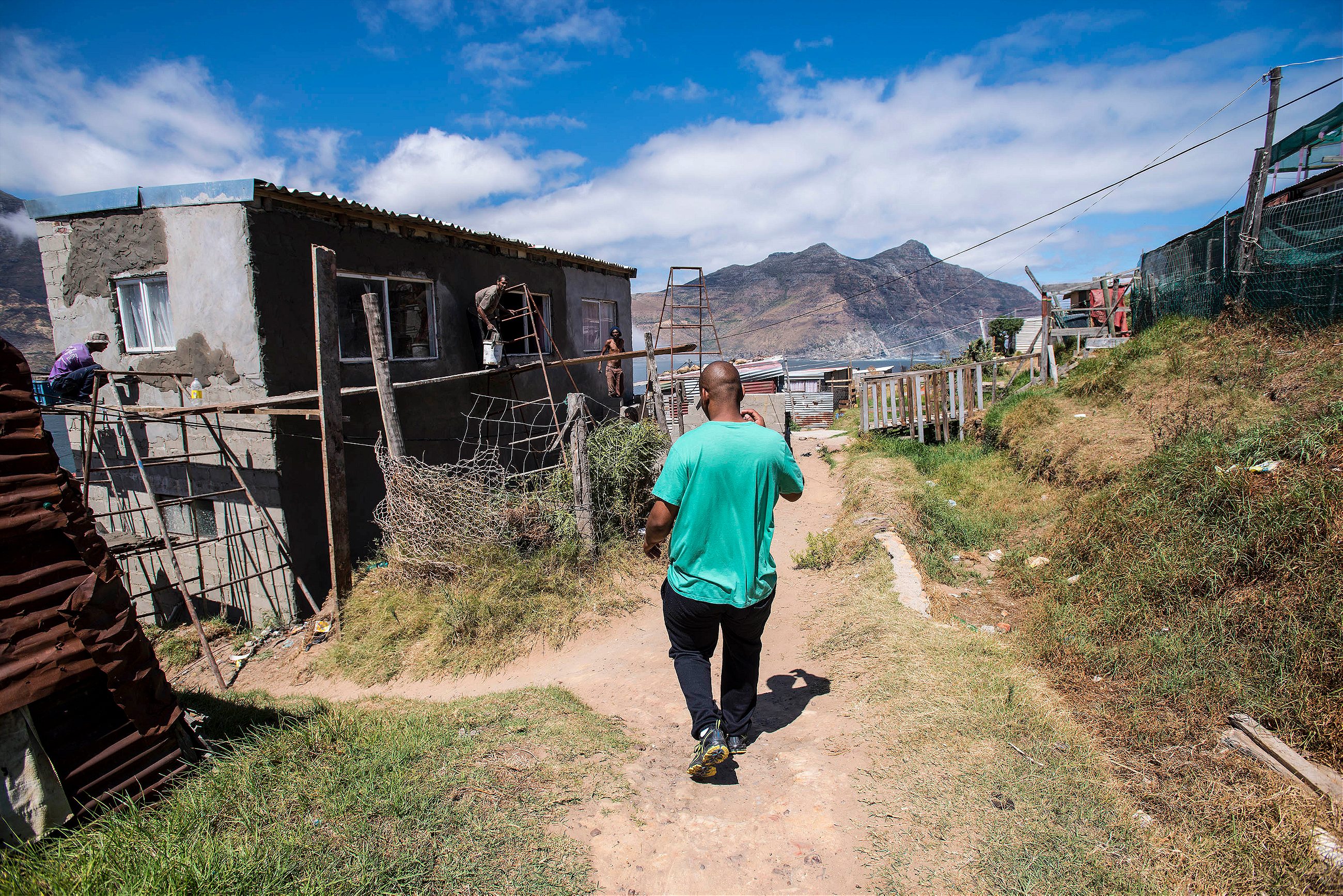
In 2001, South Africa’s unlawful abalone trade, established elsewhere in the Western Cape province for more than a decade, had just taken root in the harbor settlement, offering residents an unprecedented opportunity to prosper from the sea. Abalone had reached up to $65 per kilogram on the South African black market, a staggering sum in a country where more than half the population lived below the national poverty line of $76 a month. Although the price had fallen a little, Jacob would still be able to earn half his father’s monthly salary in a single dive—enough to pay for a new wardrobe, stock up on snacks after school, and help his grandmother buy groceries at the end of the week.
To survive the frigid, shark-infested waters of the Cape Peninsula, however, he needed guidance. He sought out a group of older poachers and began shadowing them while they worked, helping with menial tasks. Wearing a snorkel and swim trunks, he trailed them through shallow waters near Hangberg, observing their techniques. Abalone was still abundant and easy to access on the Cape Peninsula back then, carpeting the seafloor to depths of 20 feet. The shells, covered in red algae, looked like small rusting gray hubcaps cemented to the rocks. The divers popped the creatures loose with flat levers and handed them to Jacob, who stashed them inside a pouch. After selling their catch to a local buyer, the men gave Jacob some pocket money and invited him to return. Thrilled, he met up with his new mentors whenever he could. For oral presentations at school he began recounting what he’d seen underwater: lobsters, misty-eyed seals, glimmering shoals of fish. He stood taller in the playground and puffed out his chest. His friends were envious and wanted to join. But few of them could stomach the risks.
“Not everybody can do it,” he told me. “It’s dangerous. To be successful you must get over your fear. I was hungrier than the other kids, more eager to learn. I knew that by poaching I could take care of my needs.”
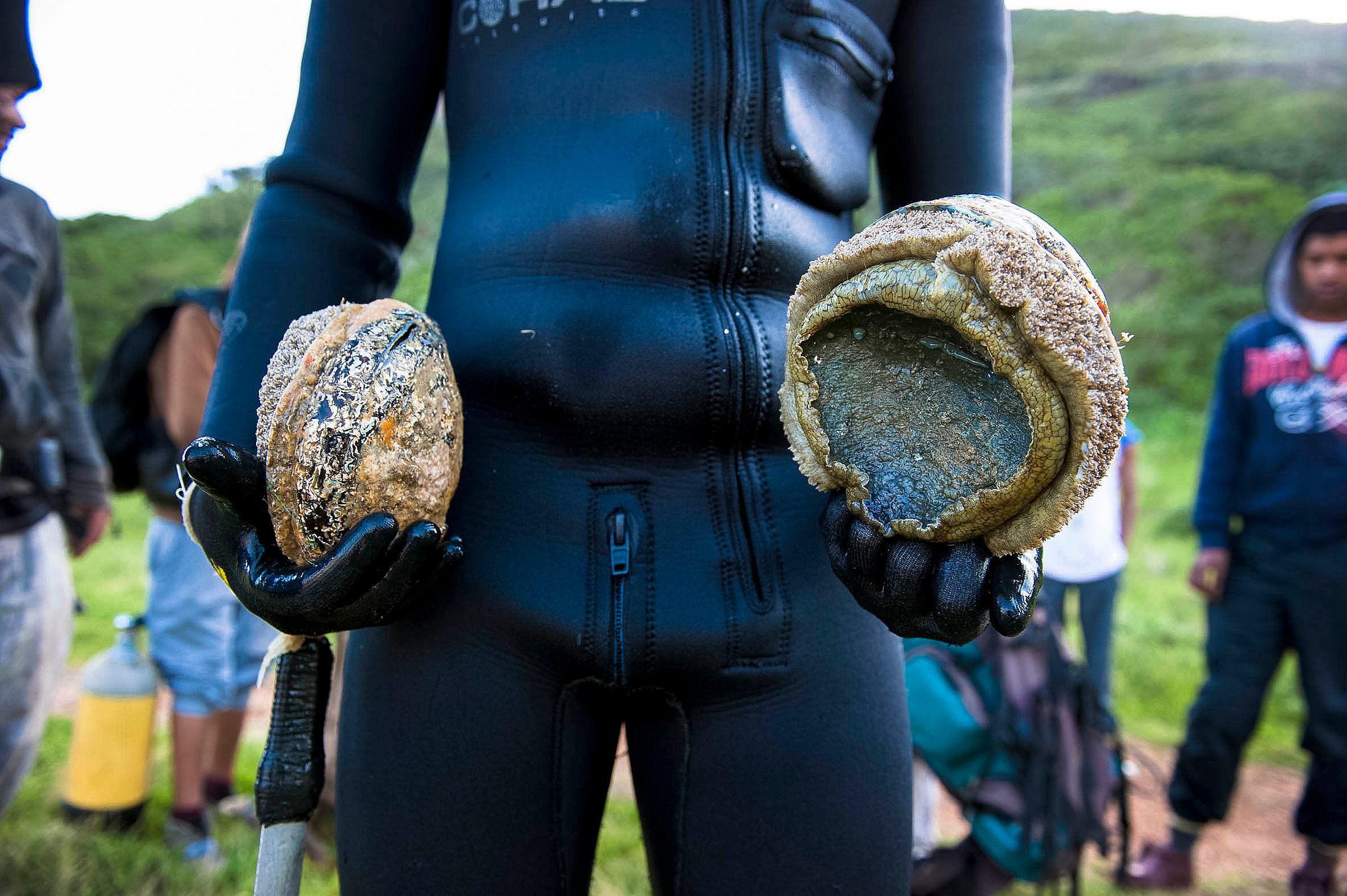
The first night on Robben Island passed without incident. Jacob and his accomplice had prepared well, with food, drinks, warm clothes, marijuana, and mandrax. They woke before sunrise to quiet seas and a clear sky. By 2010, Robben Island was already a notorious poaching hotspot; if discovered with diving gear the men faced certain arrest. They ate breakfast and shared another pipe, looking out towards Table Mountain and the city. Jacob’s accomplice, who’d suggested the trip, was “acting a bit funny,” as if he’d smoked something stronger, but Jacob thought little of it. “It was as if we were on a camping holiday,” he says. “We didn’t feel afraid.”
Both men had dived abalone off the island many times before, and knew which reefs to target. They calmly discussed plans while packing their things away: where to begin working, and where to hide the abalone they harvested. They decided they would fasten their sacks beneath the kelp and retrieve them after dark, when the boat returned. Jacob sent another text to his wife to let her know he was O.K.; she always worried when he went diving. Then he switched his cellphone off to conserve battery, stripped to his underwear, and began squeezing into his damp wetsuit.
Jacob was halfway done, shivering in the morning breeze, when his accomplice stood to relieve himself and saw an island patrol van swing into view. “Shit,” he said, falling to the ground. Unsure if they’d been spotted, the two poachers grabbed their dive masks and ran into the sea. For the next three hours, they floated in the kelp, all but impossible to spot from shore. Jacob’s accomplice started diving for abalone, quickly filling half a bag. Jacob thought this reckless with patrols so near and kept watch for danger. As the sun drew higher the coastal road filled with tour buses, cutting the men off from their camp. (The island, a World Heritage Site, attracts more than 300,000 visitors a year, with former inmates who were jailed with Nelson Mandela leading tours inside the old maximum-security prison.) “I was afraid our stuff had been discovered,” Jacob told me. “I needed my phone to call for help. It was too busy to swim ashore.”
Going numb in the 55-degree water, he turned to speak to his accomplice. Perhaps they could swim around the island and find a quieter spot to slip in. Kelp heads rose and dipped, waving like human arms. Whitewater capped exposed rocks, throwing up spray. Gulls screamed at one another. Jacob peered in every direction and realized that his partner was gone.
The illicit abalone trade has ensnared parts of society that the mainstream economy neglects
The drab shanties and tenements of Hangberg rise above the harbor in Hout Bay, an otherwise wealthy middle-class suburb on the Cape Peninsula, 20 kilometers south of central Cape Town. The Black African township of Imizamo Yethu, also known as Mandela Park, lies further up the Hout Bay valley. During apartheid, when the National Party government carved South Africa into segregated blocks, they declared Hangberg a ‘Coloreds-only’ area, reserved for people of mixed racial heritage or indigenous Khoi-San descent—not Black, not White, not Indian, but something in between. (While controversial, the term has acquired cultural significance and remains in wide use today.) Nestled within this microcosm of the apartheid state, most Hangberg residents worked on fishing vessels and in factories, supplying cheap labor for the fishing industry; as non-whites, they were denied individual fishing quotas, quality education, and the right to vote.
Jacob was seven years old when apartheid ended in 1994. He watched on television when Nelson Mandela became president after South Africa’s first inclusive elections, an event that sparked euphoric celebrations around the world. Shedding its pariah status, South Africa rejoined the global community as the ‘Rainbow Nation,’ hailed for its peaceful transition to democracy after generations of white supremacist rule. But the potency of this image has faded over the last 22 years, with wealth and opportunity remaining strongly divided along racial lines. (Income inequality has widened since the end of apartheid and consistently ranks among the highest in the world.) The illicit abalone trade, considered one of South Africa’s most pressing marine conservation threats for nearly two decades, has ensnared parts of society that the mainstream economy neglects.
“The key drivers of poaching in coastal communities are socio-economic,” says Shaheen Moolla, a consultant and former head of fisheries monitoring for the national government. “Increasing numbers of young people have very little hope of succeeding in school or the formal system.”
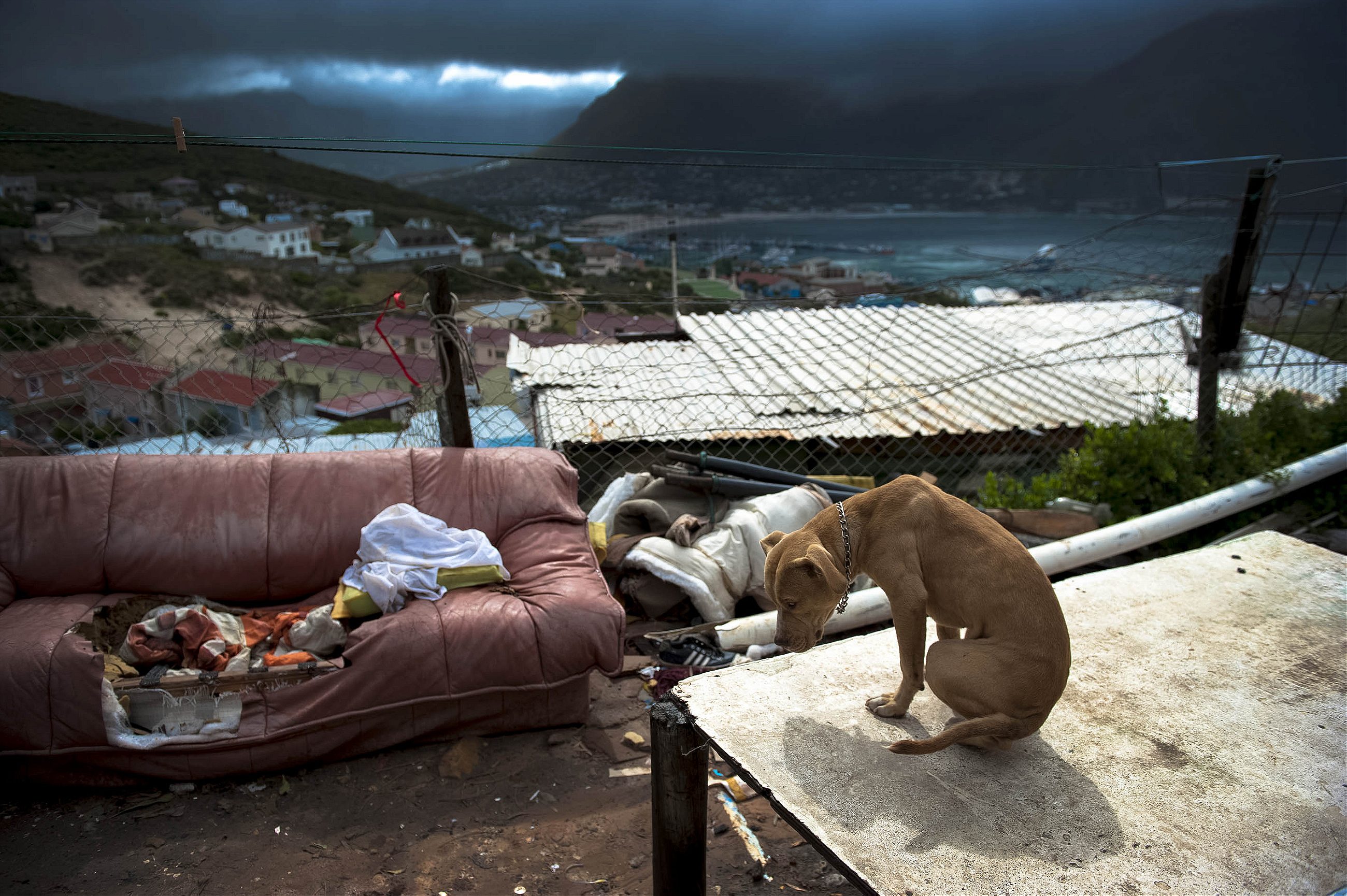
To reach Hangberg from the city, you pass through far wealthier neighborhoods: houses with landscaped gardens and tall fences, the streets patrolled by private security firms. Coffee shops and organic food stores are not difficult to find. At Hout Bay harbor, a fading commercial fishing hub, tour buses disgorge visitors to shop for curios, take selfies with boats, and queue for fish and chips. Hangberg is less than a kilometer away but feels remote at the end of the valley. There are no lawns in the settlement, just a few tarmac playgrounds and weedy plots. Informal shops housed in shipping containers sell potato chips, cigarettes, diapers, condoms, painkillers, cellphone credit, soft drinks. On weekdays and weekends, adults of working age sit in groups on upturned crates, watching people pass. There is little other sign of economic activity until you notice wetsuits and dive bags drying from open windows, or teenagers lugging battered scuba tanks up the street.
Within a year of his first dive, Jacob, then 14, was harvesting his own abalone, earning a few hundred dollars a week. He progressed to using scuba gear after informal lessons in Hout Bay harbor. This enabled him to swim deeper, spend more time underwater, and return with bigger hauls. He sold his catch to a local middleman, who in turn supplied a gangster living on the outskirts of Cape Town. Thus he entered one of the stranger pockets of the globalized natural resource market: a multi-million-dollar trade that mixes a legacy of colonial repression in South Africa with ancient Confucian food traditions, amplified by a growing appetite for drugs in the Western Cape.
According to Markus Burgener from the Southern Africa branch of TRAFFIC, a non-profit that monitors illicit wildlife trades around the world, more than 30,000 tons of South African abalone—some 75 million individual shellfish—have been harvested since 2001. The stats start there because that’s the first time reliable import statistics from Hong Kong, the epicenter of the global trade, became available. The legal South African catch over the same period, set by fisheries officials supposedly to maintain viable stocks, was close to 3,000 tons—less than ten percent of the total volume taken. The Total Allowable Catch (TAC) is currently 96 tons, just fifteen percent of the 1988 allowance of 640 tons; in 2008, the abalone fishery was temporarily closed to avert further resource depletion. It reopened after quota holders threatened legal action, arguing that they were being punished for the crimes of others. While no accurate population estimates exist, the national fisheries department considers abalone to be in a “depleted to heavily depleted” state.
The traditional instruments governments use to protect threatened species seem useless. “Fiddling with legal quotas does nothing to preserve the abalone population anymore,” says Burgener, who is also a member of the Abalone Scientific Working Group, an advisory body to the South African fisheries department. “Abalone poaching is out of control, and after two decades is showing no signs of slowing down.”
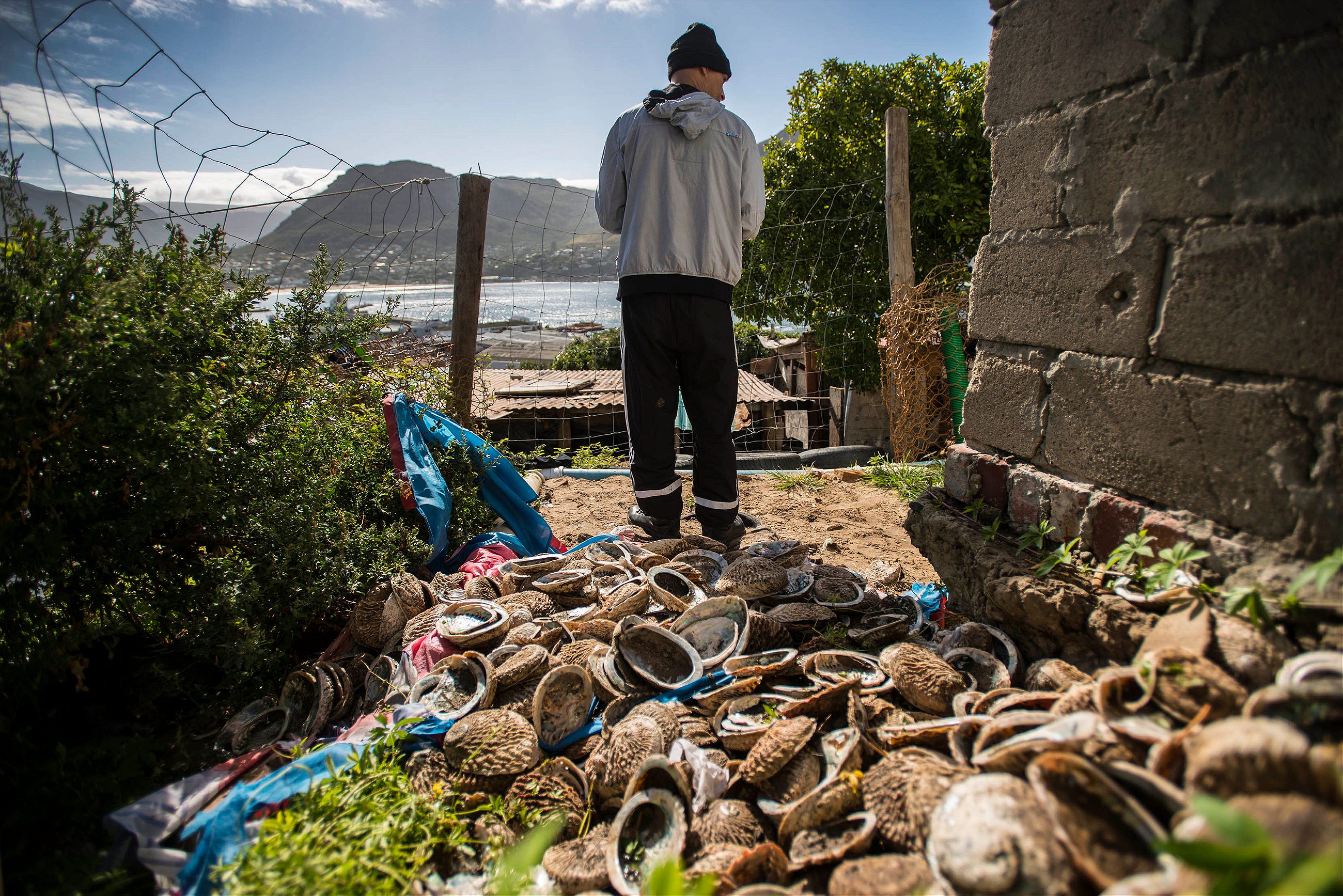
Too cold to remain in the water any longer, Jacob crept ashore and ducked behind a boulder. It was approaching noon; the sun was blistering. Jacob hadn’t drunk anything since breakfast. He crouched in a patch of shade and waited for the road to empty. The afternoon passed at a maddeningly slow rate. Jacob’s crotch and armpits chafed from the saltwater. He urinated in his wetsuit; his skin burned as it dried. Eventually, the buses stopped and he made a dash for his gear, finding their camp undisturbed. Jacob gulped down water and ripped open packets of chips before dialing the men who owned the boat.
“We’re in trouble. I’m alone. What time are you coming?”
“The engine is broken,” they told him. “We can’t fetch you until tomorrow.”
That evening, as storm clouds gathered, Jacob found his accomplice again. He had drifted off in search of richer abalone beds and spent the afternoon hiding inside a shipwreck. After dark the men relocated to the wreck together, eating chocolates for dinner and curling up inside the rusting hull. Afraid of being discovered, Jacob spent the night in his wetsuit. A cold wind swept off the ocean, lifting the stench of rotting kelp. Jacob slept fitfully. By morning, he was so raw he could barely move his arms.
The founder of the Xin Dynasty requested abalone whenever he was in a foul temper
In China, abalone is served to celebrate special occasions or honor guests. Its first record in high-end cuisine appears in the Zhou Li, a Confucian text dating to the 2nd century BC when emperors were already fond of the dish. Three hundred years later, Han Wang, the founder of the Xin Dynasty, would request abalone whenever he was in a foul temper; it apparently cheered him up. During the 17th century AD, abalone was one of eight ‘marine treasures’ reserved for senior Qing Dynasty officials. Today, along with sea cucumber, shark fin, and fish maw (dried swim bladders), abalone remains one of the four most prestigious ingredients in specialty Chinese seafood stores, prized for its taste and a range of purported medicinal benefits, including easing liver pain and boosting reproductive health. The creature also has the cosmic misfortune of resembling a gold ingot when dried. Chinese consumers, always eager to find meaning in their foods, have adopted abalone as a symbol of luck, status, and wealth.
Of more than 50 species distributed around the world, South African abalone, an endemic species found nowhere else on earth, is among the most expensive, eclipsed only by certain varieties from Japan. In dried form, the priciest mode of consumption, its flesh sells for more than $1,000 per kilogram. “If consuming fresh abalone can be compared to the refreshing feeling of drinking a beer, dried abalone is just like the mind-lingering taste of a vintage red,” wrote one Chinese food blogger in 2015.
Chinese restaurant owners in Cape Town, who asked to remain anonymous, told me that South African abalone was considered particularly tender, nutritious, and clean. (Farmed abalone, reared in elaborate aquaculture facilities, sells for nearly $130 per kilogram in certain local Chinese restaurants—more expensive than a full tasting menu, including wine pairings, at The Test Kitchen, one of South Africa’s top-ranked gourmet restaurants. In Hong Kong, a kilogram of dried abalone can fetch over $1,000.) “There’s a special flavor. South African abalone is among the best,” explains one server, an immigrant who has lived in Cape Town for eight years.
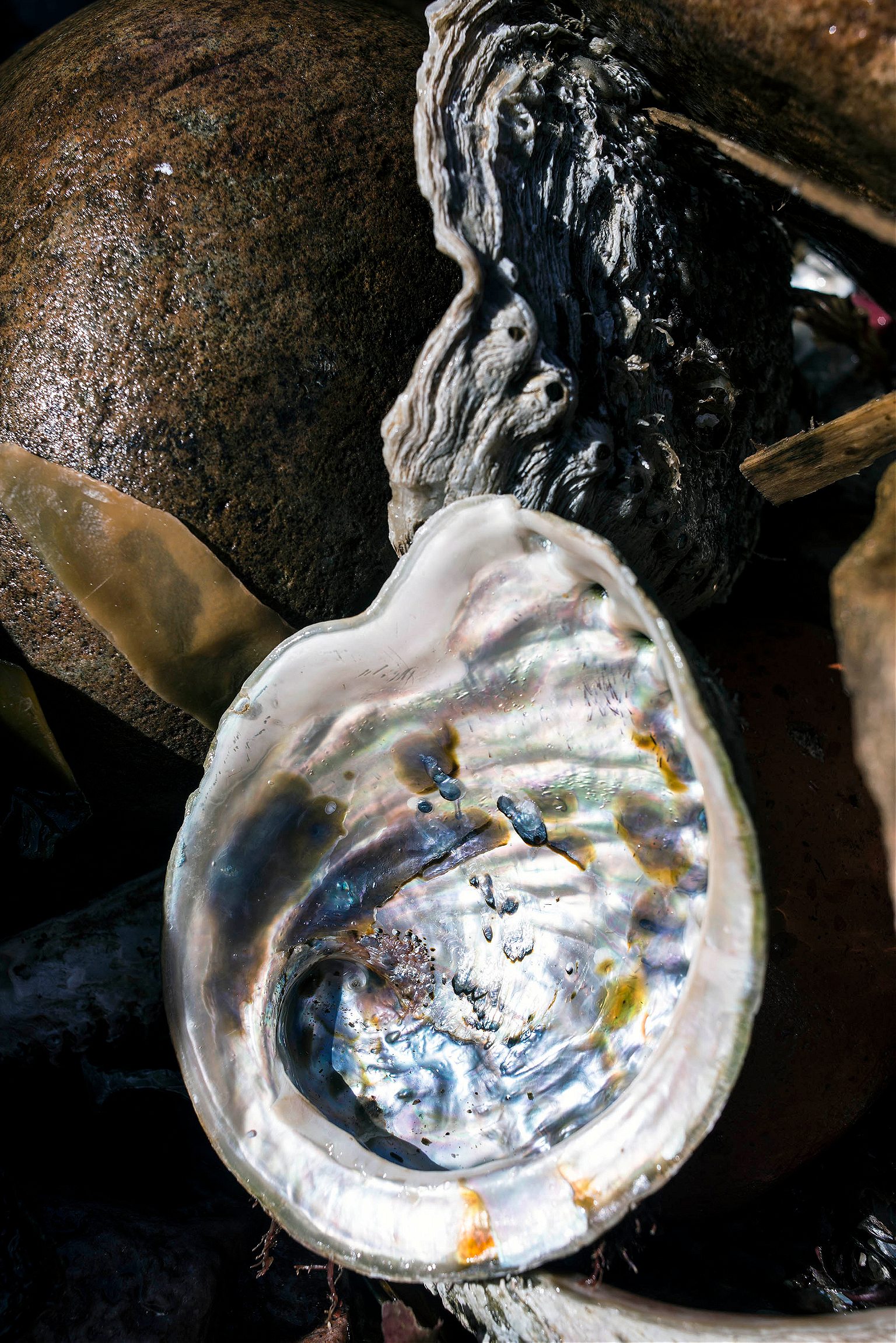
By the time Jacob turned 16, he had become the primary breadwinner in his family. His grandmother disapproved of him breaking the law but was thankful for the extra money, especially when her husband died, leaving her without a government pension. She continued cleaning homes in the Hout Bay valley, commuting by minibus taxi. Jacob bought a safe instead of opening a bank account, wary of leaving a paper trail. The illicit abalone trade was booming in Hangberg, with poachers paying cash for sports cars, cases of liquor, and flat-screen TVs. Jacob briefly quit poaching to finish high school—his grandmother, a staunch Christian, finally put her foot down—but resumed shortly after graduating. The only jobs he was otherwise eligible for paid poorly. He couldn’t afford tertiary education. Naval service, an option at one stage, fell out of favor when Jacob embarked on a short stint as a pacifist Rastafarian. He was dating the girl he would later marry and needed to move out of his grandmother’s house.
He built a cabin on vacant land above Hangberg, surrounded by bush. His girlfriend became pregnant; they married. The couple’s cramped wooden structure leaked during winter and had no electricity or running water, but for the first time they had their own space.
During Jacob’s high school hiatus, abalone poaching snowballed further in Hangberg. More than a ton of illicit product passed through the settlement some weeks, much of it stored by women in the community—mothers, grandmothers—who rented freezers out to poaching groups. Youths too afraid to dive worked as carriers, running dripping bags of abalone into Hangberg at night. Funded by larger syndicates, local kingpins invested in high-speed vessels to make off with larger volumes; fitted with twin 250-horsepower motors, the largest boats, known as ‘superducks,’ could carry twelve divers and travel 75 miles an hour. To fix up his home and support his new family, Jacob needed to reconnect with the poaching crews he had started working with in his early teens. He had to get a spot on one of those boats.
To prepare himself, Jacob asked a friend to drop him in deep water one night in 2009. It was his first night dive. The clouds were low, obscuring the stars. His friend cut the engine and shoved him overboard. Jacob swam to the bottom and sat in total darkness.
“It was terrifying,” he told me. “You’re alone. When you put on the torch, you can only see what’s in front of you. Your heart is thumping. You want it to be over. You must get over the shock. You have to get that fear out of your mind.”
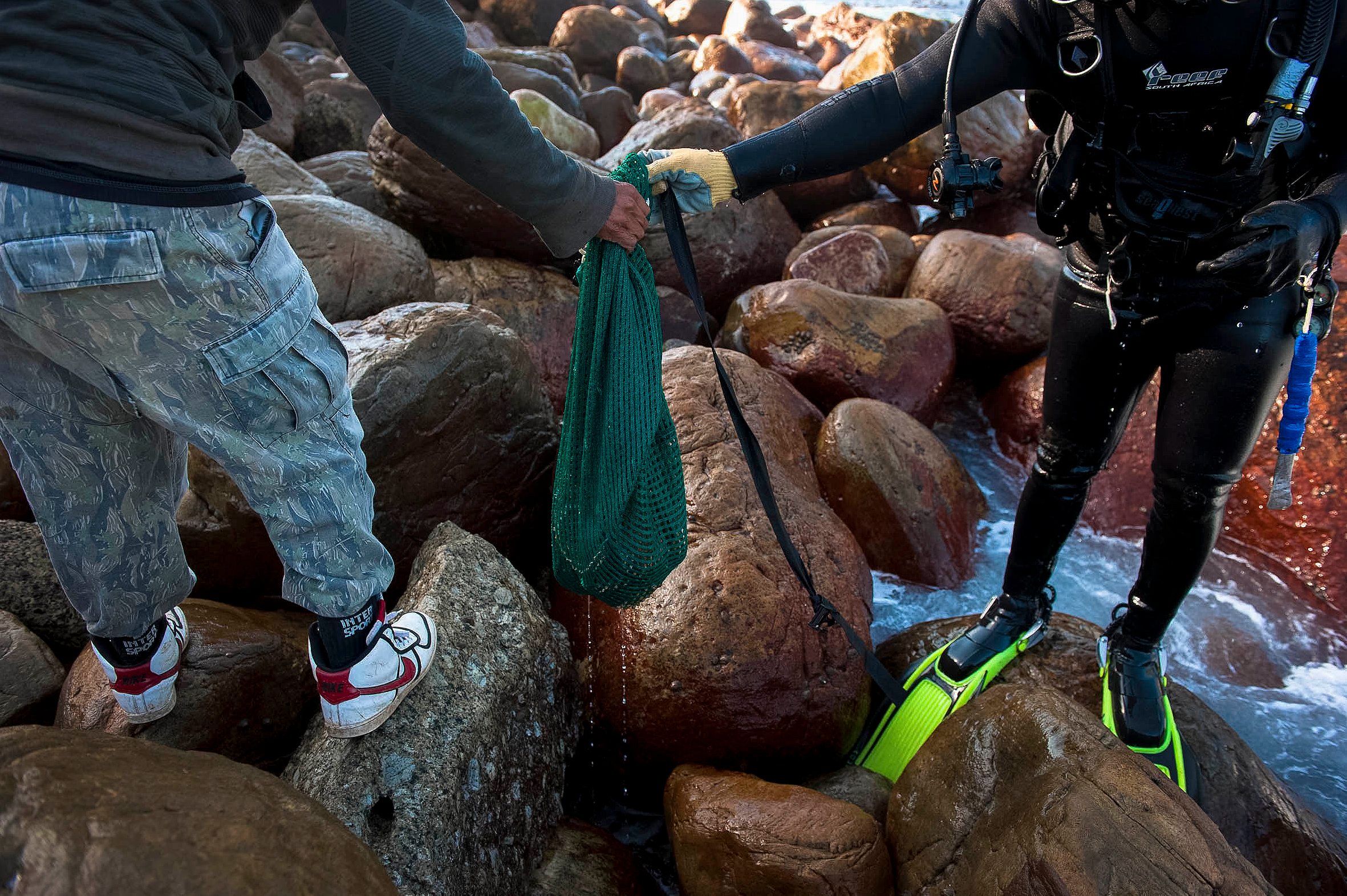
The illicit abalone trade evolved from an informal operation in the late 1980s to a well-organized criminal system just a decade later, its profits attracting entrepreneurs from disparate underworlds. Triad cartels, the late-21st-century manifestation of ancient Chinese protection rackets, had the networks and muscle to move thousands of tons of contraband halfway across the planet, adding abalone to a portfolio of trafficked items including shark fin, narcotics, counterfeits, and people. It became easier to conduct business in South Africa when the country opened its borders after apartheid, but Triad groups still needed help obtaining abalone from local fishing communities. This came from street gangs who controlled the Western Cape drug trade and had strong networks throughout the province. Within a few years, Chinese buyers were exchanging drugs for abalone, obviating the need for cash and inserting themselves at the heart of the Cape criminal economy.
“The Chinese syndicates who control the abalone trade are closely connected to top drug merchants. We often come across drugs when we raid abalone storage facilities,” says Dino Govender, head of the Special Investigations Unit at the national fisheries department. The trade relationship began with mandrax in the 1990s. The tablets, known as ‘buttons,’ are smoked with marijuana for a sleepy, hypnotic high. Mandrax is addictive, and overdoses can be fatal. But in the early 2000s abalone syndicates began importing a more destructive substance.
Abuse of crystal methamphetamine, an aggressive stimulant known locally as ‘tik,’ has reached crisis levels in the Cape within the last 15 years. Tik spread in conjunction with poaching: In return for abalone, Triad groups provided local gangs with the precursor chemicals ephedrine and pseudoephedrine, facilitating the drug’s cheap and large-scale manufacture. While both parties profited handsomely from this arrangement, the effects in fishing communities were devastating, the convergence of poaching and hard drugs culminating in an unprecedented wave of addiction.
The South African abalone trade has brought money to coastal settlements in need. It has also expanded the reach, and thus potential for harm, of the criminal economy. It was Carl Linnaeus, the Swedish father of taxonomy, who assigned the species its scientific name, Haliotis midae, in 1758, almost 250 years before its value surged. His choice of wording was prescient. Haliotis, which denotes the genus, means ‘sea ear,’ and is common to all abalone species. But midae, specific to the South African variety, stems from Midas, the king of Greek myth who gained the ability to turn all he touched into gold, and then accidentally turned his beloved daughter into a golden statue. This is Midas’ gift for modern-day South Africa: abalone poaching has been a gilded curse.
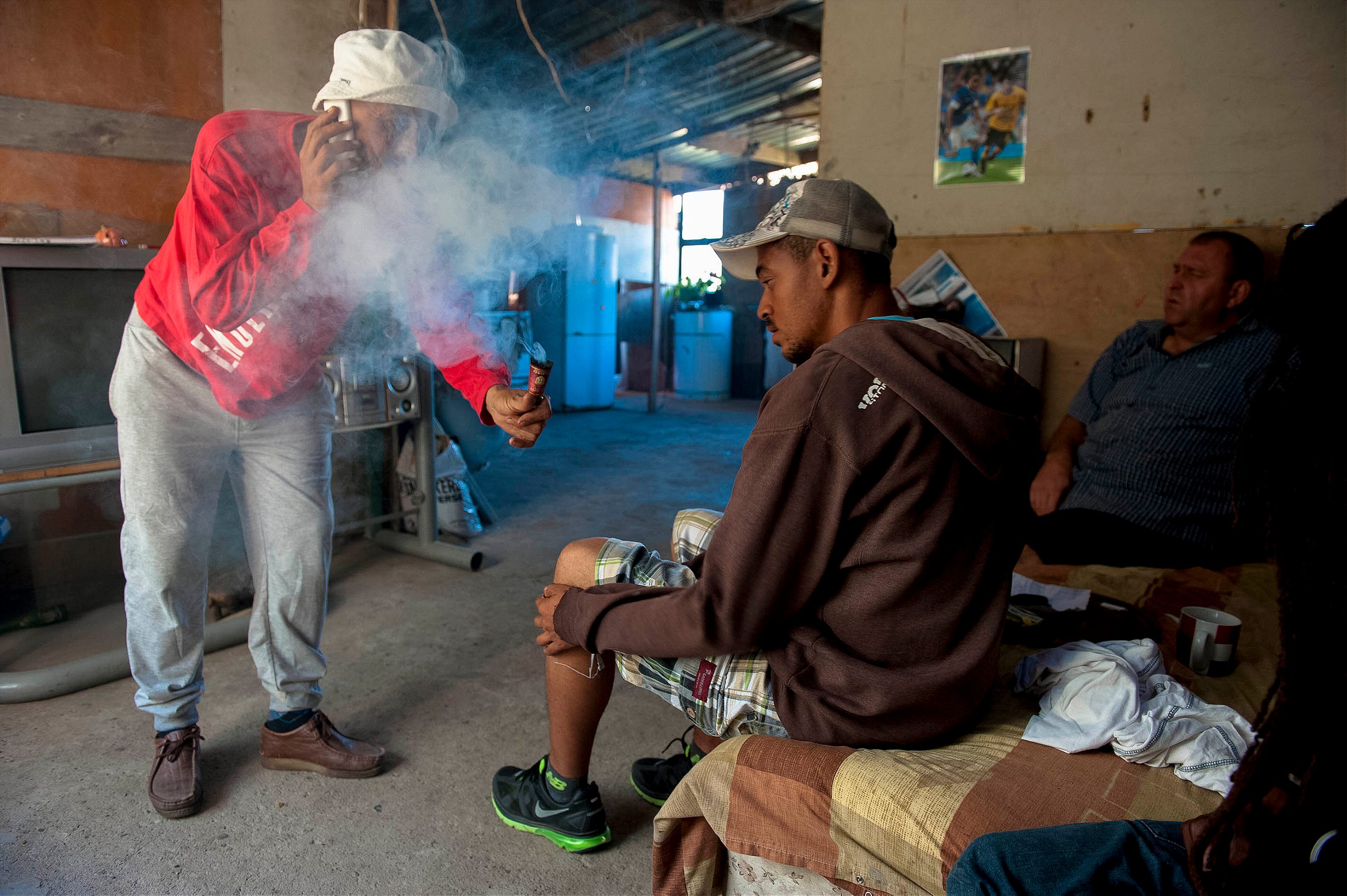
The rescue took place after midnight. After three days on Robben Island the men were dehydrated and out of food. A powerful swell had come up, dark lumps creasing the bay. Jacob’s cellphone was dead. That afternoon, in order to make his final call, he’d taken the battery out and laid it on a warm rock; the heat had drawn a small charge. “Let my wife know I’m coming home,” he told the man on the other end before the line cut.
Unsure what time the boat would arrive, Jacob stood beside the wreck for hours, waiting for a flash of torchlight or the sound of an engine. His accomplice lay at his feet, quivering in a state of methamphetamine withdrawal. Finally, Jacob heard a buzz and made out a faint black shape behind the waves. He roused his partner and made his way to the water.
“He insisted on bringing his bag of abalone,” Jacob says. “I tried to convince him to leave it behind, but he wouldn’t. I said, ‘Fuck the money, man, let’s go!’”
They swam towards the breakers. A current tugged them sideways. The waves churned up foam that filled their mouths. It felt difficult to move. A large wave broke in front of them and they ducked beneath it, dragged back towards the shore. Another wave thundered, followed by another. Jacob came up facing the lighthouse. His accomplice was sucking air.
“I yelled at him to keep going,” Jacob told me. “He said he couldn’t. He wouldn’t let go of his bag.”
The boat was a hundred yards out, prevented from coming any nearer by the rough seas. A fourth wave rolled in; Jacob could see a fifth behind it. “Then I remembered something my grandfather taught me when I was a boy,” he told me. “He said, ‘Big waves came in groups of seven.’ After two more broke I grabbed that guy. I kicked as hard as I could.”
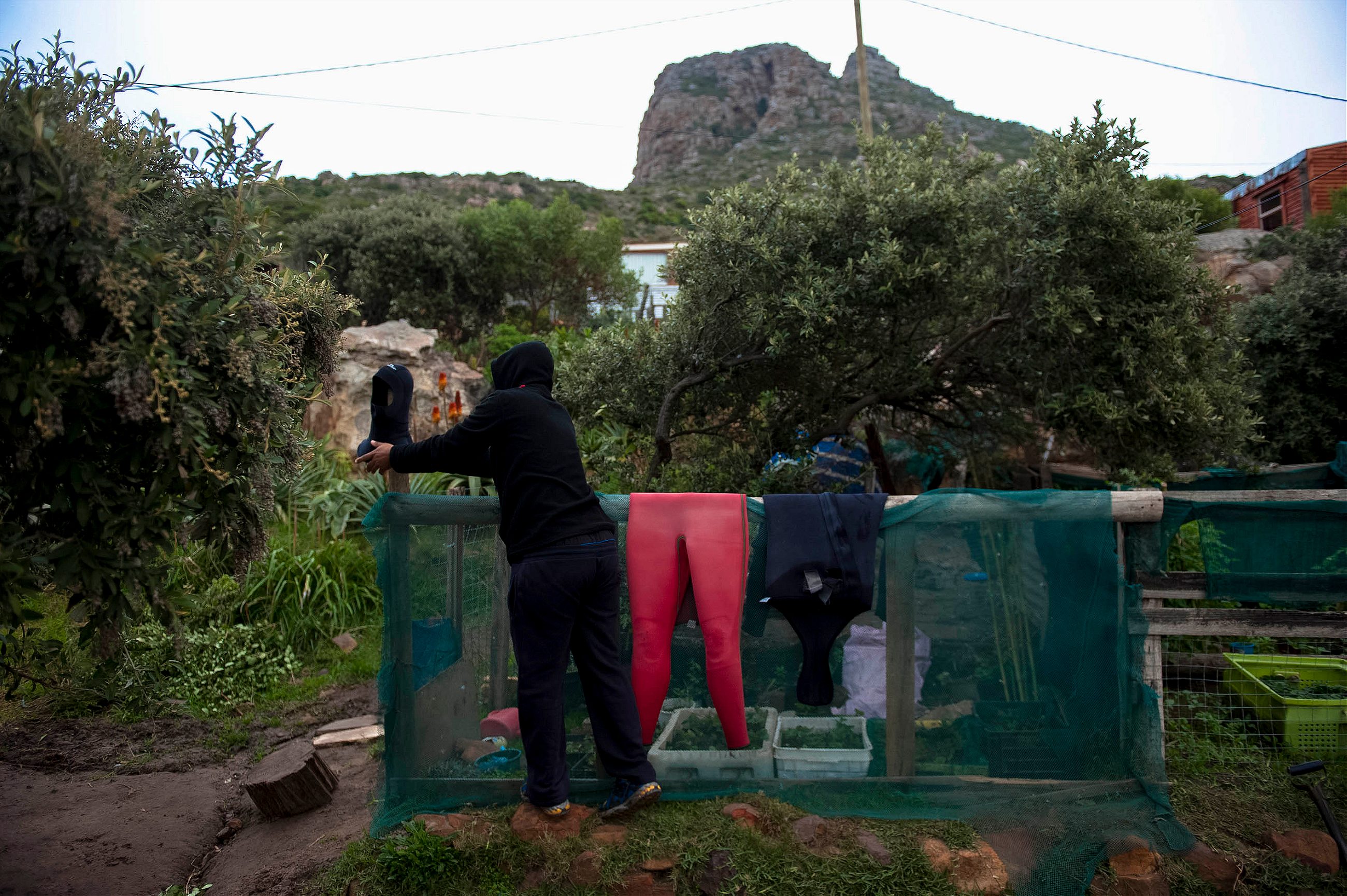
The accomplice survived, earning $80 for his half-filled bag, which he clutched until reaching the boat. Jacob returned with nothing—but compared to most of his contemporaries has had a lucky ride. He hasn’t fallen victim to drug addiction. He sees a wider arc to his poaching career, though finding a way out remains elusive.
His wife gave birth to their third child last year. Their home has a flush toilet and new electrical outlets. In winter, the rooms are dry. Planning to leave the abalone trade behind, Jacob has fenced off his property and started farming poultry. (His great-grandfather was a farmer in the Hout Bay valley before losing his land during apartheid.)
“This is my exit strategy,” Jacob told me when I last visited him. It was early afternoon. He was playing hide and seek with his seven-year-old daughter, grinning from behind a bush, when I arrived. Ducks and chickens scratched inside motley cages. Jacob took me to see a larger enclosure he was building around back.
“I have more than 80 birds,” he said. “I’m going to shelter them here over winter. I sell eggs to my church congregation. People want more than I can provide.”
His dive gear was folded inside a plastic crate in the kitchen. A spate of bad weather had prevented him working that week. His cellphone kept ringing—a separate handset he uses only for poaching jobs. “They’re calling to see if a dive is possible tonight,” he told me. A light rain was falling. His daughter was bundled up on the couch. “I’ll go out again as soon as I can.”
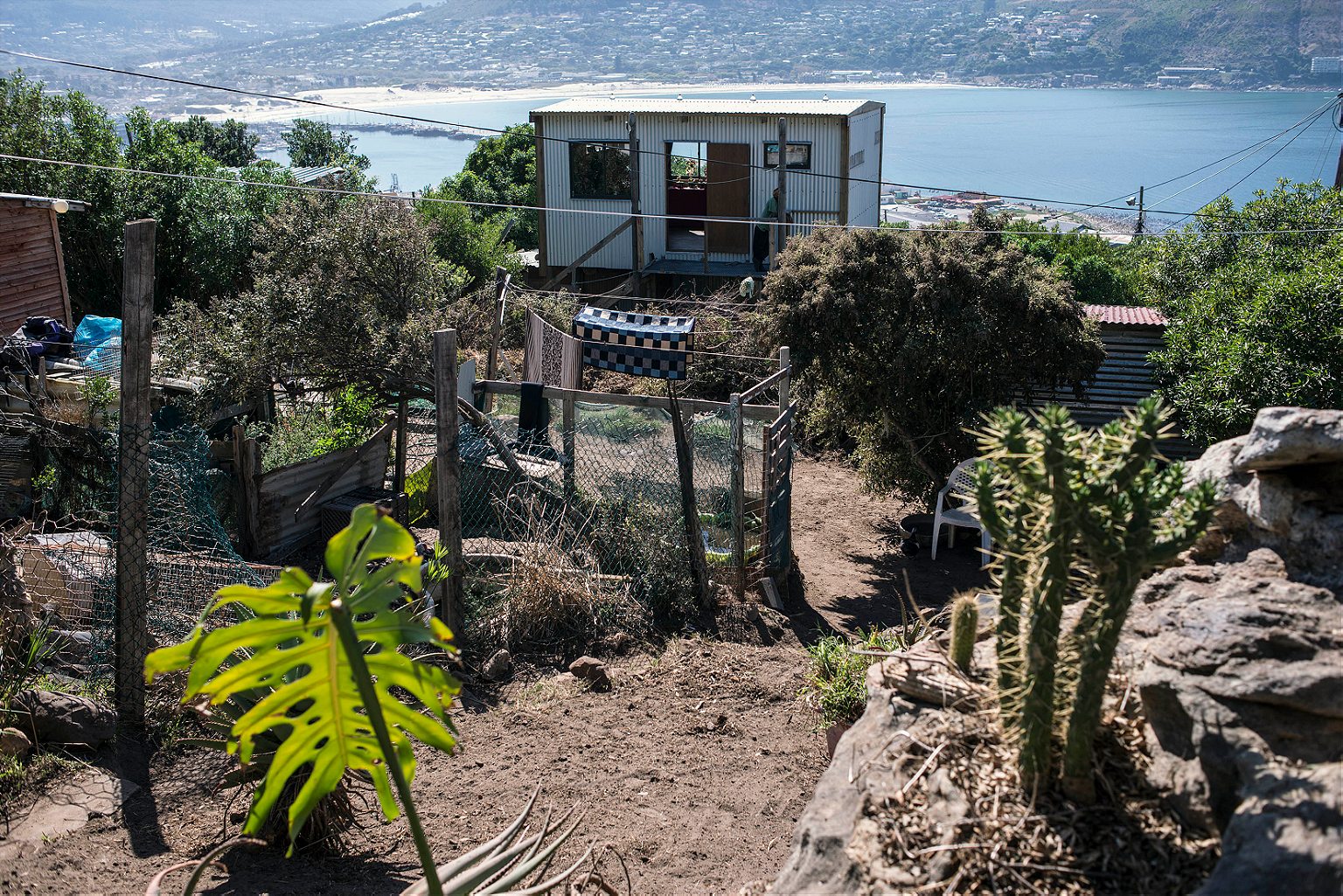
If caught and found guilty of poaching, Jacob could spend two years in jail. Surfacing in the dark, he may be struck and maimed—or killed—by a boat’s propeller. This has happened to other divers at Robben Island. Sharks have killed at least four abalone poachers in South Africa; one night, Jacob watched a Great White glide by at the fringe of his torchlight and vanish into the kelp. His ducks and chickens provide eggs and meat but can’t pay for renovations, school fees, or Christmas gifts. He can still earn a few hundred dollars in a night from abalone, even though the species has become more difficult to find.
“I’ve been doing this since I was a kid,” Jacob said. “Abalone has paid for everything. But I can’t keep poaching forever.”
He crossed to the window and checked the sky. The clouds were thinning, turning the bay a dark, blotchy green. Gusts of wind sliced the surface. Jacob took the phone from his pocket and dialed.
David Harrison is a photographer based in Cape Town. He has been working for South African newspapers for 12 years and also works with a number of NGOs and civil society organizations.
